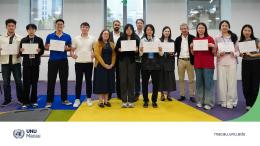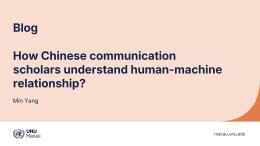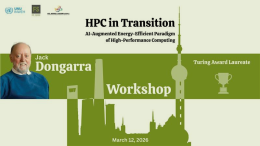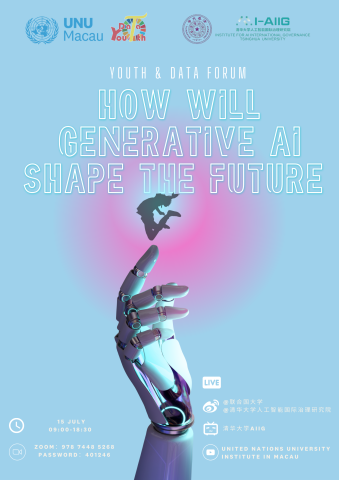
The Second "Data and Youth" Forum, with the theme of "How Will Generative AI Shape the Future?", is set to officially commence on July 15th, 2023, at 9:00 AM Beijing time. The event, initiated by the United Nations University Institute in Macau (UNU Macau) and supported by the Institute of Artificial Intelligence International Governance (I-AIIG) at Tsinghua University, aims to delve into the impact and future of generative AI technology.
This forum will be held online and will be simultaneously broadcast on the YouTube platform of the United Nations University Institute in Macau, Weibo @ United Nations University, and Weibo @ Tsinghua University's Institute of Artificial Intelligence International Governance. The "Data and Youth" forum insists on youth-led and youth-involved spirits. It will focus on two main topics: the technology and applications of generative AI, and the legal risks and policy concerns associated with it. Invitations have been extended to outstanding young representatives from various fields to share their experiences and achievements in scientific research and practical applications within the realm of generative AI.
Agenda
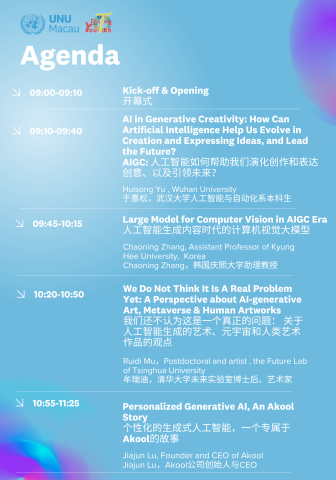
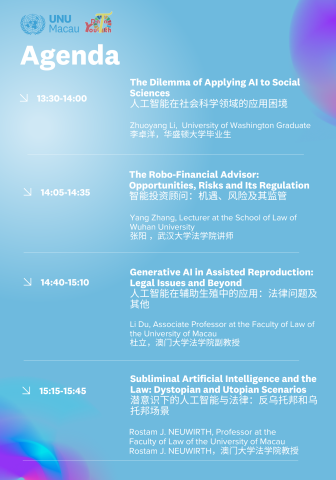
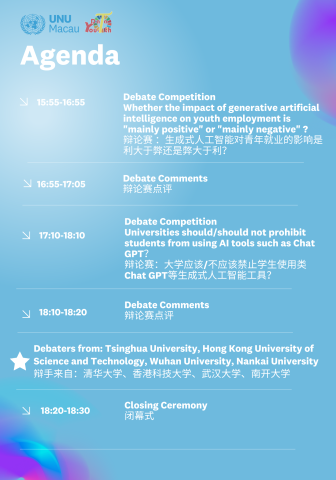
Guest Speakers
Rostam J. NEUWIRTH
Dr. Rostam J. NEUWIRTH, Professor of Law and Head of the Department of Global Legal Studies at the Faculty of Law of the University of Macau. His research interests are wide-ranging, covering international economic law, EU law, intellectual property law, and transnational law. In recent years, Professor Rostam has been interested in the legal governance of artificial intelligence. In 2023, he published a monograph titled “The EU Artificial Intelligence Act: Regulating Subliminal AI Systems”.
Li Du
Dr. Li Du, Associate Professor at the Faculty of Law of the University of Macau. His teaching and research interests include international law, health law, biotechnology law and policy, data protection and privacy. He has published many academic articles in leading international journals and frequently shares his academic research at international conferences.
Zhang Chaoning
Dr. Zhang Yang, Lecturer at the School of Law of Wuhan University. He has been a visiting scholar at the University of Mississippi in the United States and the University of Melbourne in Australia. He has published more than twenty papers in journals such as “Law Science”, “Tsinghua University Law Journal”, “Global Law Review”, “Australian Journal of Asian Law”. He has presided over many projects, including a department-level project supported by the China Law Society and a key project supported by the Securities Association of China and so on.
Zhang Yang
Zhang Yang, Lecturer at the School of Law of Wuhan University. He has been a visiting scholar at the University of Mississippi in the United States and the University of Melbourne in Australia. He has published more than twenty papers in journals such as "Law Science ", ”Tsinghua University Law Journal”, ” Global Law Review”, "Australian Journal of Asian Law". He has also presided over department-level topics for the China Law Society and key projects for the China Securities Industry Association, as well as participated in numerous projects supported by the National Social Science Fund, the Ministry of Education, the Ministry of Justice.
Lu Jiajun
Mr. Lu is the founder and CEO of Akool, one of the global leaders in the field of artificial intelligence and computer vision. With over a decade of experience in these two areas, Lu has been involved in numerous widely reported projects, managed several teams and start-ups, delivering excellent products and achieving tremendous success. He published a book named <Enhanced Human> and won the award Top 50 CEOs of Artificial Intelligence companies. Akool is a tech company that uses generative AI technology to provide businesses with services such as automatic business text writing, image and video editing, and avatar creation.
Mu Ruidi
Dr. Mu is a young artist currently affiliated with the Future Laboratory at Tsinghua University, where she is undertaking postdoctoral research in art practice and artificial intelligence. Her doctoral research focused on the relationship between chance art and photography, and her doctoral thesis explored the new possibilities of contemporary chance art that combines photography with environmental installations. Her work has been exhibited in multiple countries including China, the UK, France, and Japan, and spans mediums such as easel painting, photography, installation art, performance art, and new media. Through her creative work, she seeks to explore, discover, question, and challenge the relationship between everyday life and art.
Li Zhuoyang
Mr.Li graduated from the University of Washington, studied Economics Data Science. He is currently pursuing his master’s degree at the Viterbi School of Engineering at the University of Southern California. His areas of interest include the application of neural networks, machine learning and artificial intelligence for data analysis. He participated in various seminars held by industries like Amazon and Microsoft. The projects he used to work on include Seattle Housing Price Prediction, Orange Juice Pricing Strategies, etc.
Yu Songhui
An undergraduate from the Department of Artificial Intelligence and Automation at Wuhan University, he is an intermediate-level Vision Architect at the Ministry of Industry and Information Technology Talent Center. He has won several national computer competition awards and has participated in research for several national key laboratory projects related to artificial intelligence. Currently, he is working on a startup in the field of artificial intelligence and content generation.
English Debate Event
In the debate event, we have invited outstanding young debaters from Tsinghua University, Wuhan University, and Nankai University to present a thought-provoking intellectual feast on cutting-edge topics.
Topic 1: Does generative artificial intelligence have a net positive or negative impact on youth employment?
Topic 2: Should universities prohibit or allow students to use generative artificial intelligence tools such as ChatGPT?
Following the debates, scholars from various universities, experts from technology companies in the data field, and student representatives will join the panel to engage in in-depth discussions about the policies and regulations of academic institutions in the field of artificial intelligence. Their professional insights will provide us with a broader vision and stimulate critical thinking, as we explore the establishment of adaptable rules and policies in the ever-evolving field of artificial intelligence.

